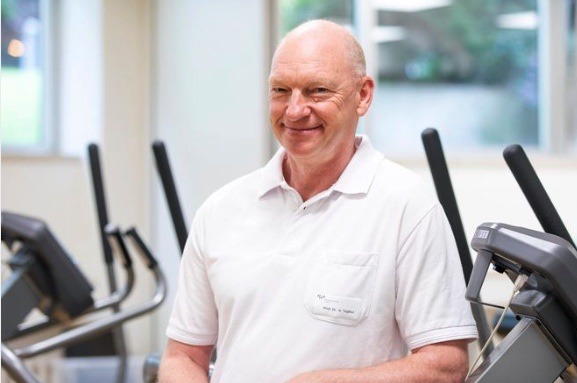Sports physician presents e-bike health study results
Cyclists in Hamburg (symbol image), Photo: Westend61 / Getty Images
E-bike health study finds that riding an e-bike every day reduces the risk of a heart attack by 40 percent
In a large-scale study, researchers at Hannover Medical School examined how healthy e-biking is. Study director Uwe Tegtbur says the findings surprised him.
An interview by Andreas Haslauer
03/29/2023, 1:52 p.m
SPIEGEL: Mr. Tegtbur, you conducted a medical study on the subject of e-biking and cycling with almost 2,000 test subjects. Why?
Tegtbur: The Federal Ministry of Transport, the Leibniz University of Hanover and we at the Medical University wanted to know how healthy riding an e-bike actually is.
About Uwe TegtburPhoto: Karin Kaiser / MHH Prof. Dr. Uwe Tegtbur is Director of the Institute for Sports Medicine at the Hannover Medical School and President of the Sports Doctors Association of Lower Saxony. Since February 2017 he has been working with a research team on a large-scale e-bike health study.
|
SPIEGEL: And what is your conclusion?
Tegtbur: First of all, allow me a preliminary remark. There are two types of people: some ride e-bikes, others bicycles. These two groups differ significantly in their characteristics such as diseases and age. E-bikers have nothing to do with cyclists.
SPIEGEL: I do not understand that. Both are sitting on a bike.
Tegtbur: The proportion of e-bike riders who have an illness is about 35 percent. Here I’m talking about people who suffer from joint wear and tear, diabetes, high blood pressure or obesity. They get on their bike because it has an electric motor. This means they arrive free of symptoms – even if it sometimes takes longer. But there is something that unites both groups. And to be honest, I didn’t expect this result.
SPIEGEL: What result are you talking about?
Tegtbur: Our e-bike health study evaluated data from a total of 1,250 e-bike riders and 629 cyclists. The average heart rate of the e-bikers was just five beats below the heart rate of the cyclists during their rides. It is still said that e-bikes are not real bikes, just low-performance motorbikes. Even more: e-bikes would even make you lazy and sluggish. That’s not a sport. All nonsense! Riding an e-bike is a sport. The knowledge gained from the e-bike health study is clear.
The risk of dementia and Alzheimer’s also decreases if you cycle regularly.
SPIEGEL: Don’t exertion and heart rate also depend on which mode you ride in?
Tegtbur: People naturally chose a support level. Most of the time they were in “Tour” or “Eco” mode. This means that the motor supports people on inclines or headwinds, which is what it’s there for, after all.
SPIEGEL: Opponents of e-biking say it dulls the positive effects of exercise.
Tegtbur: What the critics forget is that people still have to pedal and are constantly challenged by their bikes. And that’s a good thing, too, because then they’re riding at an average heart rate of 110 in their basic endurance zone.
SPIEGEL: What does that mean?
Tegtbur: Depending on your training level, this means that you are moving about at 60 to 80 percent of your maximum heart rate. From a scientific point of view, there is no better training in the basic endurance zone. This has a positive effect on the cardiovascular system. If you ride an e-bike 12 to 15 kilometers every day, the risk of suffering a heart attack is reduced by 40 percent. In addition, the risk of metabolic syndrome, i.e. obesity, high blood pressure and sugar and lipid metabolism disorders, decreases by around 50 percent, and the risk of cancer by 30 percent.
SPIEGEL: You claim that riding an e-bike prevents diseases?
Tegtbur: I’m not just saying that, that’s the way it is. There are many so-called survey studies in the bike industry. However, we didn’t just ask questions, we measured: We evaluated a total of 58,833 trips, 34,438 by pedelec drivers, and 24,065 by cyclists. We can provide complete evidence that e-biking – just like cycling, of course – is excellent cardiovascular training. In addition, e-biking lowers cholesterol and reduces the risk of fatty liver. The risk of dementia and Alzheimer’s also decreases if you cycle regularly.
Cycling reduces stress levels and increases mental performance, blood circulation, and oxygen supply.
SPIEGEL: How did you conduct the study?
Tegtbur: The e-bikers sat in the saddle for an average of 135 minutes a week – all year round, from January to December. That also helps. Because the longer you ride the e-bike, the more chronic inflammation is reduced. Endurance sports such as cycling have anti-inflammatory and antioxidant effects. This means: Even people with previous illnesses can cycle healthier with the e-bike.
SPIEGEL: So should people be pedaling like crazy?
Tegtbur: No, don’t. When it comes to jogging, the rule has always been “run without panting”. It is said that you should be able to talk while jogging. Because if you go too fast, you no longer have the right training effect. It’s the same with cycling. If we pedal moderately and our body is supplied with sufficient oxygen, we will achieve good training results. On the other hand, if you constantly overexert yourself, you will achieve nothing. Even worse: the training can even be counterproductive.
SPIEGEL: So don’t ride too fast. How about the duration? Can you sit on the e-bike for too long?
Tegtbur: As long as you ride in the moderate range, you can be on the road for hours. Then only the pounds tumble. If you ride longer, you lose weight.
SPIEGEL: Can you please be more specific? What exactly happens in the body?
Tegtbur: When we ride in the basic endurance zone, millions of so-called mitochondria in our muscle cells switch on. They are colloquially referred to as mini power plants. Their job is to produce adenosine triphosphate, a chemical molecule that provides energy in every cell. When the mitochondria really get going, they are responsible for first attacking and then cracking our fat deposits.
SPIEGEL: Ingo Froboese from the German Sport University in Cologne says that cycling is the healthiest sport on this planet. Is he right?
Tegtbur: Yes, along with cross-country skiing, cycling is the best sport in the world. Cycling reduces your own stress level, increases mental performance, blood circulation and oxygen supply, while at the same time protecting the joints from osteoarthritis. But the important thing is and remains: Please don’t overspend! It is better to ride up the mountain in a low gear, but with a high cadence. Even with less pressure on the pedals and a moderate pace, the muscles, joints, bones and cartilage are stimulated. And do you know what the result is?
E-biking makes you healthy and happy
SPIEGEL: I’m sure you’ll tell me.
Tegtbur: Bone density increases, the risk of osteoporosis decreases. Of course, this also applies to a cross trainer in the gym. However, the bicycle has the advantage that it is an everyday object that we can use every day to get from A to B. I can hardly say to 83 million Germans that they should run to the gym every day.
SPIEGEL: Then what do you advise?
Tegtbur: My advice to Germans is that if possible, they should leave their cars at home and get on their e-bikes instead. Many e-bikers already commute to work over distances of 5 to 20 kilometers. I do it myself almost every day when I drive from Isernhagen to the Medical University in Hanover – albeit with a gravel bike without support. It lifts my spirits and I always get a lot of ideas.
SPIEGEL: Not to mention the positive effects on the climate.
Tegtbur: Exactly, that’s added. Federal Transport Minister Volker Wissing did the math: if we all used our bicycles, we could save up to four million CO₂ emissions every year compared to 2017. All this not only leads to a reduction in noise pollution, but also to fewer physical and mental illnesses. And then there is another great effect: E-biking to work dilates the arteries. This blood pressure-lowering effect lasts the whole working day and is as effective as a drug. That’s great, isn’t it?
SPIEGEL: What is the conclusion of your study?
Tegtbur: E-biking makes you healthy and happy. The longer you drive, the more serotonin you release. When I drive up the Sa Calobra Pass on Mallorca or here on the Brocken in the Harz Mountains, the happiness hormone just shoots out of my pores.


